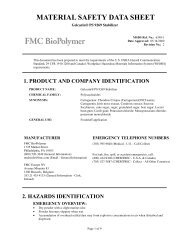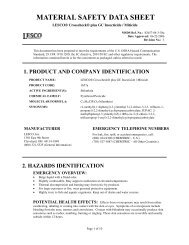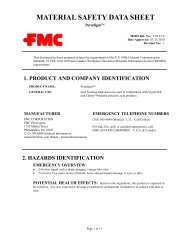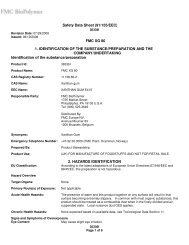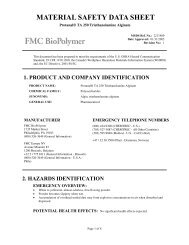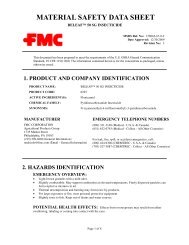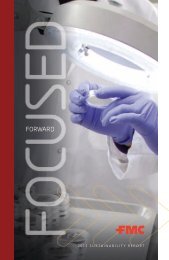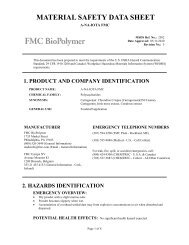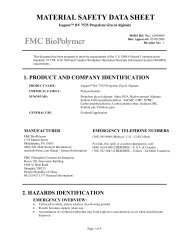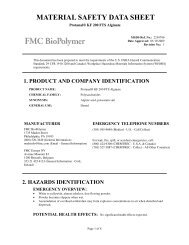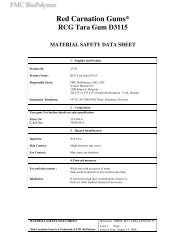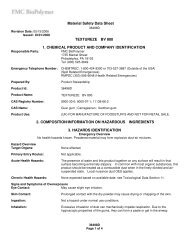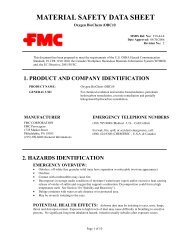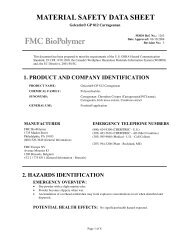SeaSpen® Carrageenan - FMC Corporation
SeaSpen® Carrageenan - FMC Corporation
SeaSpen® Carrageenan - FMC Corporation
Create successful ePaper yourself
Turn your PDF publications into a flip-book with our unique Google optimized e-Paper software.
MATERIAL SAFETY DATA SHEET<br />
<strong>SeaSpen®</strong> <strong>Carrageenan</strong><br />
Page 1 of 9<br />
MSDS Ref. No.: F8-40-2-1<br />
Date Approved: 10/15/2009<br />
Revision No.: 8<br />
This document has been prepared to meet the requirements of the U.S. OSHA Hazard Communication<br />
Standard, 29 CFR 1910.1200 and Canada’s Workplace Hazardous Materials Information System (WHMIS)<br />
requirements.<br />
1. PRODUCT AND COMPANY IDENTIFICATION<br />
PRODUCT NAME: <strong>SeaSpen®</strong> <strong>Carrageenan</strong><br />
CHEMICAL FAMILY: Polysaccharides, Phosphates, Sulfates<br />
SYNONYMS: <strong>Carrageenan</strong>: Chondrus Crispus (<strong>Carrageenan</strong>) (INCI name),<br />
Carrageenin, Irish moss extract, Condrus extract; Trisodium<br />
Phosphate: TSP, duodecahydrate; Calcium sulfate, dihydrate: Terra<br />
alba, gypsum, native calcium sulfate<br />
ALTERNATE PRODUCT NAME(S): <strong>SeaSpen®</strong> PF; Marine Colloids <strong>Carrageenan</strong><br />
GENERAL USE: Excipient<br />
MANUFACTURER<br />
<strong>FMC</strong> BioPolymer<br />
1735 Market Street<br />
Philadelphia, PA 19103<br />
(800) 526-3649 (General Information)<br />
msdsinfo@fmc.com (Email - General Information)<br />
<strong>FMC</strong> Europe NV<br />
Avenue Mounier 83<br />
1200 Brussels, Belgium<br />
353 21 435 4133 (General Information - Cork,<br />
Ireland)<br />
2. HAZARDS IDENTIFICATION<br />
EMERGENCY TELEPHONE NUMBERS<br />
(207) 594-3200 (<strong>FMC</strong> Plant - Rockland, ME)<br />
(303) 595-9048 (Medical - U.S. - Call Collect)<br />
For leak, fire, spill, or accident emergencies, call:<br />
(800) 424-9300 (CHEMTREC - U.S.A. & Canada)<br />
(703) 527-3887 (CHEMTREC - Collect - All Other Countries)<br />
EMERGENCY OVERVIEW:<br />
• Dry powder with a slight marine odor.<br />
• Powder becomes slippery when wet.<br />
• Accumulation of overhead settled dust may form explosive concentrations in air when disturbed and<br />
dispersed.
<strong>SeaSpen®</strong> <strong>Carrageenan</strong> (F8-40-2-1) Date: 10/15/2009<br />
POTENTIAL HEALTH EFFECTS: Expected to be irritating to respiratory tract and<br />
mucous membranes.<br />
3. COMPOSITION / INFORMATION ON INGREDIENTS<br />
Chemical Name CAS# Wt.% EC No. EC Class<br />
<strong>Carrageenan</strong> 9000-07-1 232-524-2 Not classified<br />
Trisodium Phosphate 7601-54-9 231-509-8 Not classified<br />
Calcium Sulfate, dihydrate 10101-41-4 None Not classified<br />
4. FIRST AID MEASURES<br />
EYES: Flush with water for at least 15 minutes. If irritation occurs and persists, obtain medical<br />
attention.<br />
SKIN: Wash with plenty of soap and water. Get medical attention if irritation occurs and persists.<br />
INGESTION: Drink plenty of water. Never give anything by mouth to an unconscious person. If any<br />
discomfort persists, obtain medical attention.<br />
INHALATION: Remove to fresh air. If breathing difficulty or discomfort occurs and persists,<br />
contact a medical doctor.<br />
NOTES TO MEDICAL DOCTOR: This product is expected to have low oral and inhalation<br />
toxicity, and moderate dermal toxicity. It is non-irritating to the eyes and may be irritating to the skin. It is<br />
expected to be irritating to the respiratory tract and mucous membranes. Skin contact with trisodium<br />
phosphate may result in pain, redness, swelling and blisters. Ingestion may cause severe nausea, vomiting,<br />
abdominal discomfort and burning sensations. Inhalation of dust may cause coughing, sneezing and<br />
irritation to the nose and throat. Phosphates are laxatives.<br />
5. FIRE FIGHTING MEASURES<br />
EXTINGUISHING MEDIA: Water, carbon dioxide.<br />
Page 2 of 9
<strong>SeaSpen®</strong> <strong>Carrageenan</strong> (F8-40-2-1) Date: 10/15/2009<br />
FIRE / EXPLOSION HAZARDS: As with any fine particulate matter, the accumulation of<br />
excessive dust on overhead structures may form explosive concentrations when disturbed and dispersed.<br />
FIRE FIGHTING PROCEDURES: For fires involving this material, do not enter any<br />
enclosed or confined fire space without wearing full protective clothing and self-contained breathing<br />
apparatus (SCBA) approved for firefighting. This is necessary to protect against the hazards of heat,<br />
products of combustion and oxygen deficiency. Do not breathe smoke, gases or vapors generated.<br />
FLAMMABLE LIMITS: Not applicable<br />
6. ACCIDENTAL RELEASE MEASURES<br />
RELEASE NOTES: Powder becomes slippery when wet. Maintain good housekeeping practices<br />
to minimize accumulation of settled dust, especially on overhead surfaces. Sweep up the spilled material<br />
and dispose of in accordance with the waste disposal method outlined in Section 13, "Disposal<br />
Considerations".<br />
7. HANDLING AND STORAGE<br />
HANDLING AND STORAGE: Use local exhaust or general dilution ventilation to control<br />
exposure to dust. Always use safe lifting techniques when manually moving containers, especially when<br />
shipping containers weighing more than 50 pounds (22.7 kg). To protect quality, store in a tight container in<br />
a dry place, at room temperature (approximately 25°C). Pallets should be stacked in a stable manner.<br />
Maintain adequate clearance from structural members and sprinklers; NFPA and U.S. OSHA state a<br />
minimum of 18 inches (45.7 cm) clearance shall be maintained between the top of storage and the ceiling<br />
sprinkler deflectors.<br />
8. EXPOSURE CONTROLS / PERSONAL PROTECTION<br />
PERSONAL PROTECTIVE EQUIPMENT<br />
EYES AND FACE: Whenever airborne dust concentrations are high, appropriate<br />
protective eyewear, such as mono-goggles, should be worn to prevent eye contact.<br />
RESPIRATORY: Whenever dust in the worker's breathing zone cannot be controlled with<br />
ventilation or other engineering means, workers should wear respirators or dust masks approved by<br />
NIOSH/MSHA, EU CEN or comparable certification organization to protect them against airborne<br />
dust.<br />
PROTECTIVE CLOTHING: No special clothing is required.<br />
GLOVES: No special gloves are required.<br />
Page 3 of 9
<strong>SeaSpen®</strong> <strong>Carrageenan</strong> (F8-40-2-1) Date: 10/15/2009<br />
9. PHYSICAL AND CHEMICAL PROPERTIES<br />
ODOR: Slight marine<br />
APPEARANCE: Dry powder<br />
AUTOIGNITION TEMPERATURE: Not applicable<br />
BOILING POINT: Not applicable<br />
COEFFICIENT OF OIL / WATER: (Octanol/Water) Not applicable<br />
EVAPORATION RATE: (Butyl acetate = 1) Not applicable<br />
FLASH POINT: Not applicable<br />
FREEZING POINT: Not applicable<br />
MELTING POINT: Not applicable<br />
pH: 7.0 - 9.5 (1% solution)<br />
SOLUBILITY IN WATER: (% by weight) 10% maximum<br />
SPECIFIC GRAVITY: (H2O = 1) Approximately 1 g/cc<br />
VAPOR PRESSURE: Not applicable<br />
10. STABILITY AND REACTIVITY<br />
CONDITIONS TO AVOID: None known<br />
STABILITY: Stable<br />
HAZARDOUS DECOMPOSITION PRODUCTS: Will produce oxides of sulfur on burning.<br />
11. TOXICOLOGICAL INFORMATION<br />
EYE EFFECTS: Non-irritating (rabbit)<br />
SKIN EFFECTS: No data available for the formulation.<br />
<strong>Carrageenan</strong>: Non-irritating (rabbit)<br />
TSP: Practically non-irritating (rabbit) Minimally irritating (rabbit)<br />
DERMAL LD50: No data available for the formulation.<br />
<strong>Carrageenan</strong>: > 2,000 mg/kg (rabbit)<br />
TSP: > 300 mg/kg (rabbit)<br />
ORAL LD50: No data available for the formulation.<br />
<strong>Carrageenan</strong>: > 5,000 mg/kg (rat)<br />
Page 4 of 9
<strong>SeaSpen®</strong> <strong>Carrageenan</strong> (F8-40-2-1) Date: 10/15/2009<br />
TSP: 7,400 mg/kg (rat)<br />
INHALATION LC50: No data available for the formulation.<br />
<strong>Carrageenan</strong>: > 0.93 mg/l (4 h) (rat) Maximum attainable concentration - zero mortality<br />
SENSITIZATION: No data available for the formulation.<br />
<strong>Carrageenan</strong>: (Skin) Non-sensitizing (guinea pig)<br />
ACUTE EFFECTS FROM OVEREXPOSURE: This product is expected to have low<br />
oral and inhalation toxicity, and moderate dermal toxicity. It is non-irritating to the eyes and may be<br />
irritating to the skin. It is expected to be irritating to the respiratory tract and mucous membranes. Skin<br />
contact with trisodium phosphate may result in pain, redness, swelling and blisters. Ingestion may cause<br />
severe nausea, vomiting, abdominal discomfort and burning sensations. Inhalation of dust may cause<br />
coughing, sneezing and irritation to the nose and throat. Phosphates are laxatives.<br />
CHRONIC EFFECTS FROM OVEREXPOSURE: No data available for the<br />
formulation. Long term and lifetime feeding studies with carrageenan in laboratory animals were negative,<br />
as were reproductive outcomes and mutagenicity studies. Trisodium phosphate was negative in the ames<br />
assay.<br />
CARCINOGENICITY:<br />
Chemical Name IARC NTP OSHA Other<br />
<strong>Carrageenan</strong> 3 Not listed Not listed (ACGIH) Not listed<br />
12. ECOLOGICAL INFORMATION<br />
ENVIRONMENTAL DATA: No data available for the formulation. Inorganic compounds in<br />
contact with soil, sub-surface or surface waters may be taken up by plants and utilized as essential<br />
nutrients. Phosphates may also form precipitates, usually with calcium or magnesium. The resultant<br />
compounds are insoluble in water and become a part of the soil or sediment. The term biodegradability, as<br />
such, is not applicable to inorganic compounds.<br />
ECOTOXICOLOGICAL INFORMATION: No data available for the formulation.<br />
<strong>Carrageenan</strong> is an extract of seaweeds of the class Rhodophyceae (red seaweeds), and is not expected to<br />
have significant toxicity to aquatic organisms.<br />
13. DISPOSAL CONSIDERATIONS<br />
DISPOSAL METHOD: No special disposal methods are suggested. It is the user's responsibility<br />
to comply with all applicable local, state, and federal laws, rules, regulations and standards.<br />
Page 5 of 9
<strong>SeaSpen®</strong> <strong>Carrageenan</strong> (F8-40-2-1) Date: 10/15/2009<br />
14. TRANSPORT INFORMATION<br />
U.S. DEPARTMENT OF TRANSPORTATION (DOT)<br />
ADDITIONAL INFORMATION: This material is not a hazardous material as<br />
defined by US Department of<br />
Transportation at 49 CFR Parts 100 through<br />
185.<br />
INTERNATIONAL MARITIME DANGEROUS GOODS (IMDG)<br />
ADDITIONAL INFORMATION: Not regulated as a hazardous material<br />
ADR - EUROPEAN AGREEMENT CONCERNING THE<br />
INTERNATIONAL CARRIAGE OF DANGEROUS GOODS BY ROAD<br />
ADDITIONAL INFORMATION: Not regulated as a hazardous material<br />
INTERNATIONAL CIVIL AVIATION ORGANIZATION (ICAO) /<br />
INTERNATIONAL AIR TRANSPORT ASSOCIATION (IATA)<br />
ADDITIONAL INFORMATION: Not regulated as a hazardous material<br />
OTHER INFORMATION:<br />
CANADIAN TRANSPORT (TDG):<br />
This material is not regulated when transported by road in Canada.<br />
15. REGULATORY INFORMATION<br />
UNITED STATES<br />
SARA TITLE III (SUPERFUND AMENDMENTS AND REAUTHORIZATION ACT)<br />
SECTION 302 EXTREMELY HAZARDOUS SUBSTANCES (40 CFR 355, APPENDIX A):<br />
Not applicable<br />
Page 6 of 9
<strong>SeaSpen®</strong> <strong>Carrageenan</strong> (F8-40-2-1) Date: 10/15/2009<br />
SECTION 311 HAZARD CATEGORIES (40 CFR 370):<br />
Not applicable<br />
SECTION 312 THRESHOLD PLANNING QUANTITY (40 CFR 370):<br />
The Threshold Planning Quantity (TPQ) for this product, if treated as a mixture, is 10,000 lbs;<br />
however, this product contains the following ingredients with a TPQ of less than 10,000 lbs.:<br />
None<br />
SECTION 313 REPORTABLE INGREDIENTS (40 CFR 372):<br />
This product does not contain any toxic chemicals subject to the reporting requirements of<br />
Section 313, Title III of the SARA (Superfund Amendments and Reauthorization Act) of<br />
1986.<br />
CERCLA (COMPREHENSIVE ENVIRONMENTAL RESPONSE COMPENSATION AND<br />
LIABILITY ACT)<br />
CERCLA DESIGNATION & REPORTABLE QUANTITIES (RQ) (40 CFR 302.4):<br />
Listed<br />
Chemical Name RQ<br />
Trisodium Phosphate 5,000 lb (listed under Sodium phosphate, tribasic)<br />
TSCA (TOXIC SUBSTANCE CONTROL ACT)<br />
CANADA<br />
TSCA INVENTORY STATUS (40 CFR 710):<br />
All components are listed or exempt.<br />
WHMIS (WORKPLACE HAZARDOUS MATERIALS INFORMATION SYSTEM):<br />
This product has been classified in accordance with the hazard criteria of the Controlled Products<br />
Regulations and the MSDS contains all the information required by the Controlled Products<br />
Regulations.<br />
Hazard Classification / Division: E<br />
Domestic Substance List: Listed (components)<br />
E NUMBERS:<br />
E 407 (carrageenan)<br />
E 339(iii) (trisodium phosphate)<br />
E 516 (calcium sulfate)<br />
INTERNATIONAL LISTINGS<br />
<strong>Carrageenan</strong><br />
Australia (AICS): Listed<br />
China: Listed<br />
Philippines (PICCS): Listed<br />
New Zealand: Listed<br />
Trisodium phosphate<br />
Australia (AICS): Listed<br />
Page 7 of 9
<strong>SeaSpen®</strong> <strong>Carrageenan</strong> (F8-40-2-1) Date: 10/15/2009<br />
China: Listed<br />
Japan (ENCS): (1)-497<br />
Korea: KE-34912<br />
Philippines (PICCS): Listed<br />
New Zealand: Listed<br />
Calcium sulfate, dihydrate<br />
Australia (AICS): Listed<br />
China: Listed<br />
Japan (ENCS): (1)-193<br />
Philippines (PICCS): Listed<br />
New Zealand: Listed<br />
Calcium sulfate<br />
China: Listed<br />
HAZARD AND RISK PHRASE DESCRIPTIONS:<br />
EC Symbols: (Not classified as hazardous)<br />
EC Risk Phrases: (Not classified as hazardous)<br />
16. OTHER INFORMATION<br />
NFPA<br />
Health 1<br />
Flammability 1<br />
Reactivity 0<br />
Special None<br />
No special requirements<br />
NFPA (National Fire Protection Association)<br />
Degree of Hazard Code:<br />
4 = Extreme<br />
3 = High<br />
2 = Moderate<br />
1 = Slight<br />
0 = Insignificant<br />
REVISION SUMMARY:<br />
This MSDS replaces Revision #7, dated June 03, 2008.<br />
Changes in information are as follows:<br />
Section 8 (Exposure Controls / Personal Protection)<br />
Section 11 (Toxicological Information)<br />
Page 8 of 9
<strong>SeaSpen®</strong> <strong>Carrageenan</strong> (F8-40-2-1) Date: 10/15/2009<br />
Section 14 (Transport Information)<br />
Section 15 (Regulatory Information)<br />
Section 16 (Other Information)<br />
SeaSpen, Marine Colloids and <strong>FMC</strong> BioPolymer Logo - <strong>FMC</strong> Trademarks<br />
© 2009 <strong>FMC</strong> <strong>Corporation</strong>. All Rights Reserved.<br />
Page 9 of 9



